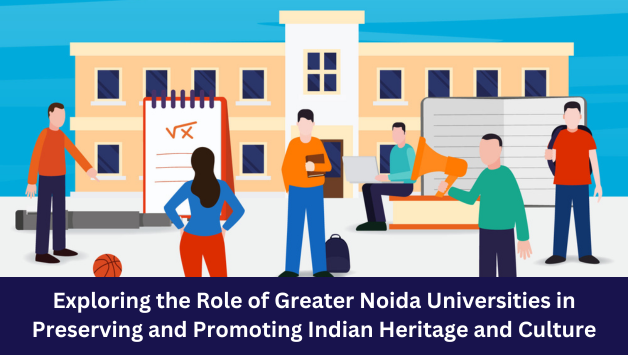Introduction:
Greater Noida, a city rich in history and culture, is home to numerous universities that play a pivotal role in preserving and promoting India's rich heritage. From ancient monuments to traditional arts and crafts, these institutions, with the support of programs like the Post Graduate Diploma in Management (PGDM) at the Delhi Institute of Higher Education (DIHE), are actively engaged in initiatives to safeguard and showcase the country's cultural legacy. This article delves into the multifaceted role of Greater Noida's universities in preserving and promoting Indian heritage, with insights from the top management colleges in Greater Noida at DIHE.
Guardians of Cultural Treasures:
Greater Noida's universities serve as custodians of India's cultural treasures, housing libraries, archives, and museums that preserve invaluable artifacts, manuscripts, and documents. Institutions are actively involved in the conservation and restoration of historical monuments, archaeological sites, and heritage buildings, ensuring that future generations can appreciate and learn from India's rich architectural and artistic heritage.
Promotion of Traditional Arts and Crafts:
One of the key roles of universities in Greater Noida is to promote traditional arts and crafts, which are integral to India's cultural identity. Colleges offering PGDM programs support artisans, weavers, and craftsmen through initiatives such as craft fairs, exhibitions, and workshops. By providing platforms for artisans to showcase their skills and connect with consumers, institutions contribute to the preservation and revival of traditional crafts and livelihoods.
Cultural Festivals and Events:
Cultural festivals and events organized by universities in Greater Noida serve as vibrant celebrations of India's diverse cultural heritage. Institutions host events such as music concerts, dance performances, and food festivals that showcase the richness and diversity of Indian culture. These events not only provide entertainment and recreation but also foster a sense of pride and belonging among students and the community at large.
Heritage Studies and Research:
Greater Noida's universities are centers of excellence for heritage studies and research, offering courses, seminars, and research opportunities in fields such as archaeology, art history, and cultural anthropology. Through interdisciplinary approaches and collaborations with scholars and experts, institutions contribute to the advancement of knowledge and understanding of India's cultural heritage. Research findings and publications inform policy decisions and conservation efforts, ensuring the sustainable preservation of cultural resources.
Community Engagement and Outreach:
Universities in Greater Noida actively engage with local communities to raise awareness about the importance of cultural heritage conservation and promote active participation in heritage preservation activities. Collaborative projects, outreach programs, and heritage walks organized by institutions involve students, faculty, and community members in documenting, protecting, and promoting local heritage sites and traditions. These initiatives foster a sense of ownership and stewardship among community members, empowering them to safeguard their cultural heritage for future generations.
Digital Initiatives for Heritage Preservation:
In the digital age, universities in Greater Noida are harnessing technology to digitize and disseminate cultural heritage resources to a wider audience. Digital repositories, online exhibitions, and virtual tours developed by institutions make it possible for people to explore India's cultural heritage from anywhere in the world. These digital initiatives not only enhance accessibility but also contribute to the preservation and interpretation of cultural heritage in innovative ways.
Challenges and Opportunities:
Despite their efforts is the best institute of pgdm marketing in Noida, universities in Greater Noida face challenges such as inadequate funding, lack of infrastructure, and encroachment on heritage sites. However, these challenges also present opportunities for collaboration, innovation, and advocacy. By mobilizing resources, leveraging technology, and fostering partnerships with government agencies, NGOs, and private stakeholders, institutions like DIHE can address these challenges and strengthen their role as champions of Indian heritage preservation.
Conclusion:
Greater Noida's universities play a vital role in preserving and promoting India's rich cultural heritage, serving as custodians, promoters, and educators. Through their efforts in conservation, promotion, research, community engagement, and digital innovation, institutions like DIHE contribute to the sustainable preservation and transmission of India's cultural legacy. As we celebrate India's cultural diversity and heritage, let us recognize and support the important work being done by universities in Greater Noida to safeguard and showcase our shared cultural heritage for generations to come.


